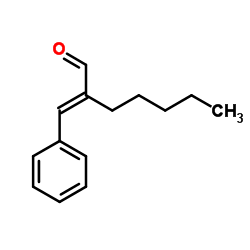α-戊基肉桂醛

α-戊基肉桂醛结构式

|
常用名 | α-戊基肉桂醛 | 英文名 | Heptanal, 2-benzylidene- |
|---|---|---|---|---|
| CAS号 | 122-40-7 | 分子量 | 202.292 | |
| 密度 | 1.0±0.1 g/cm3 | 沸点 | 288.5±0.0 °C at 760 mmHg | |
| 分子式 | C14H18O | 熔点 | N/A | |
| MSDS | 中文版 美版 | 闪点 | 131.1±14.6 °C | |
| 符号 |


GHS07, GHS09 |
信号词 | Warning |
|
Deodorants on the European market: quantitative chemical analysis of 21 fragrances.
Contact Dermatitis 38(1) , 29-35, (1998) Deodorants are one of the most frequently used types of cosmetics and side-effects from them are common. Recent studies relate perfume allergy to this type of product. 73 deodorants were analyzed by gas chromatography--mass spectrometry for the determination ... |
|
|
Natural ingredients based cosmetics. Content of selected fragrance sensitizers.
Contact Dermatitis 34(6) , 423-6, (1996) In the present study, we have investigated 42 cosmetic products based on natural ingredients for content of 11 fragrance substances: geraniol, hydroxycitronellal, eugenol, isoeugenol, cinnamic aldehyde, cinnamic alcohol, alpha-amylcinnamic aldehyde, citral, c... |
|
|
Protein binding and metabolism influence the relative skin sensitization potential of cinnamic compounds.
Chem. Res. Toxicol. 17(3) , 301-10, (2004) Skin protein modification (haptenation) is thought to be a key step in the manifestation of sensitization to low molecular mass chemicals (<500 g/mol). For sensitizing chemicals that are not protein reactive, it is hypothesised that metabolic activation can c... |
|
|
Sensitivity to alpha-amylcinnamic aldehyde and alpha-amylcinnamic alcohol.
J. Am. Acad. Dermatol. 8(1) , 76-80, (1983) Sensitivity to alpha-amylcinnamic aldehyde (alpha-AcAld) is apparently uncommon, but, like allergy to alpha-amylcinnamic alcohol (alpha-AcAlc), it often accompanies allergy to the perfume in Mycolog cream. Although alpha-AcAlc is a known ingredient, alpha-AcA... |
|
|
Toxicological tests on flavouring matters.
Food Cosmet. Toxicol. 3(4) , 563-9, (1965)
|
|
|
Rowe, D.
Perfum. Flavor. 30 , 20, (2005)
|